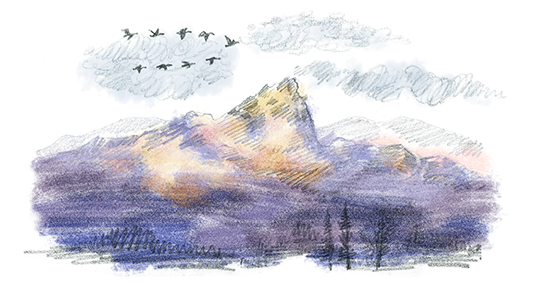Asymptote’s new Fall issue is replete with spectacular writing. See what our section editors have to say about the pieces closest to their hearts:
As writer-readers, we’ve all been there before. Who of us hasn’t been faced with that writer whose words have made us stay up late into the night; or start the book over as soon as we’re done; or after finally savoring that last word, weep—for all the words already written and that would never to be yours. The feeling is unmistakeable, physical. In her essay, “Animal in Outline,” Mireia Vidal-Conte describes this gut feeling after finishing El porxo de les mirades (The Porch of the Gazes) by Miquel de Palol: “What are we doing? I thought. What are we writing? What have we read, what have we failed to read, before sitting down in front of a blank sheet of paper? What does and doesn’t deserve readers?” There are the books that make you never want to stop writing, and the books that never make you want to write another word (in the best way possible, of course). Vidal-Conte reminds writers again that none of us is without context—for better or for worse. Her essay is smart, playful, honest, and a must-read from this issue.
—Ah-reum Han, Writers on Writers Editor
Ricardo Piglia’s “On the Threshold” is a radiant, elusive essay about that most writerly of themes: becoming a writer. It is at once a masterly history of reading, full of the pleasures of place and memory, and a history of writing, copying, and living with the doubts and hopes in which all writers share.
—Joshua Craze, Nonfiction Editor
My highlight this quarter is titled “If He Hadn’t Heard It Nothing Would Have Happened,” from our longtime contributing editor Dylan Suher. Alongside reviews of recently translated titles, which make up the bulk of Asymptote’s Criticism section, here is something slightly different: an essay on the late Patrick Hanan, authority on premodern short Chinese fiction and renowned translator from Chinese. Suher praises his meticulous scholarship on “eighteenth-century smut” and seemingly “effortless” translations of writing by Li Yu (1610–1680). In doing so, Suher stages a defence of the “scholar translator,” often maligned on account of the stereotype that scholarly translation “does justice neither to the craft of translation nor the enterprise of scholarship.” In an elegant, rigorous essay, one Harvard scholar-translator (Suher) introduces us to another (Hanan), and reminds us along the way that “both scholarship and translation require not only the discipline to stick to the facts, but the creativity to fill in the gaps between those facts.”
—Ellen Jones, Criticism Editor
Yayoi Kusama is a Japanese artist obsessed with dots. When South African poet Bibi Slippers writes about her, her poem becomes obsessed with dots:

And so does Slippers’s translator, Alice Inggs, who gives us this inventive translation of the Afrikaans-plus-dots:
spottybedotted is Yayoi Kusama
mad as a spatter and dottybesotted
I am in such admiration of these poems-in-translation that make of gallery art, emojis, and Instagram such humorous and poignant observations. Nothing is too slight or too virtual to become, literally, a key to understanding humanness: ‘what will remain of us,’ Slippers speculates, “is ’sixty slices of pizza.’ / ’cicada. shiba inu.’ ’irritable panda face.’ / ’bicep.’ ’suggestive eggplant.'” But the techne/technology most central to Slippers book is, as the title suggests, the photostat machine—”a great metaphor for translation too,” says Inggs in her translator’s note, “the imperfect copy that is in itself a type of original.”
—Aditi Machado, Poetry Editor
“My worldview is that people are strange, and they behave well and badly. The world I try to describe, I want to describe in as real a way as possible.” This from fiction writer Akhil Sharma, in conversation with interviews editor Henry Ace Knight about his recent collection of short stories, A Life of Adventure and Delight, his unsentimental writing style and worldview, and his current projects and reading habits.
Once you’ve finished reading Mr. Sharma, there’s also my conversation with Dr. Marilyn Booth about the challenges, considerations, and limitations peculiar to Arabic translation. “Given all that is going on in the Arab region,” she notes, “the works we choose to translate, the ways we translate them, the editing, and the choice of cover art all have political stakes. For me, translation is an intertwined aesthetic and political act, that is the way it should be, but it makes it all the more difficult.”
—Claire Jacobson, Assistant Interviews Editor
This issue features two provocative excerpts from full works: Babysitter by Catherine Léger, translated by Chantal Bilodeau, and I Came to See You by Karim Rashed, translated by Margaret Litvin. Léger’s play is a sardonic, witty, biting play about a callous world, everyday cruelties and who gets served. Rashed’s play is a quietly explosive piece about the ways in which human beings treat each other, apprehend their surroundings, and face moral dilemmas of the soul. Both pieces explore in highly contrasting ways the manner in which the current socio-political climate pushes human beings to extremes and make transactionality a default behavioural mode rather than an exception. Who are we to each other on this planet and why? Whom can we trust? These are two sharp plays in equally sharp, piquant translations.
*****
Read more from the Asymptote team:

